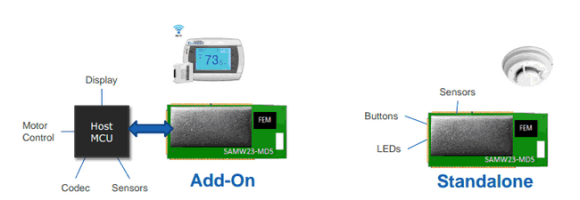This week we talked with Atmel about their new WiFi solutions targeting Internet of Things applications. Back in 2012, Atmel acquired Ozmo, a company focused on point-to-point WiFi solutions using WiFi Direct. These devices are known as SmartDirect, and have been available for some time.
Atmel has just announced a new product line: SmartConnect. This moves beyond the point-to-point nature of WiFi Direct, and enables connections to standard access points. The SmartConnect series is designed for embedding in low cost devices that need to connect to a network.
The first devices in the SmartConnect line will be modules based on two chips: an Atmel SAMD21 Cortex-M0+ microcontroller and an Ozmo 3000 WiFi System on Chip. There’s also an on-board antenna and RF shielding can. It’s a drop in WiFi module, which is certified by the FCC. You can hook up your microcontroller to this device over SPI, and have a fully certified design that supports WiFi.
There’s two ways to use the module. The first is as an add-on, which is similar to existing modules. A host microcontroller communicates with the module over SPI and utilizes its command set. The second method uses the module as a standalone device, with application code running on the internal SAMD21 microcontroller. Atmel has said that the standalone option will only be available on a case to case basis, but we’re hoping this opens up to everyone. If the Arduino toolchain could target this microcontroller, it could be a great development platform for cheap WiFi devices.

At first glance, this module looks very similar to other WiFi modules, including the CC3000 which we’ve discussed in the past. However there are some notable differences. One major feature is the built in support for TLS and HTTPS, which makes it easier to build devices with secure connections. This is critical when deploying devices that are connected over the internet.
Atmel is claiming improvements in power management as well. The module can run straight from a battery at 1.8 V to 3.3 V without external regulation, and has a deep sleep current of 5 nA. Obviously the operating power will be much higher, but this will greatly assist devices that sporadically connect to the internet. They also hinted at the pricing, saying the modules will come close to halving the current price of similar WiFi solutions. SmartConnect is targeting a launch date of June 15, so we hope to learn more this summer.
We’re always excited to see better connectivity solutions. If Atmel comes through with a device allowing for cheaper and more secure WiFi modules, it will be a great part for building Internet of Things devices. With a projected 50 billion IoT devices by 2020, we expect to see a lot of progress in this space from silicon companies trying to grab market share.











